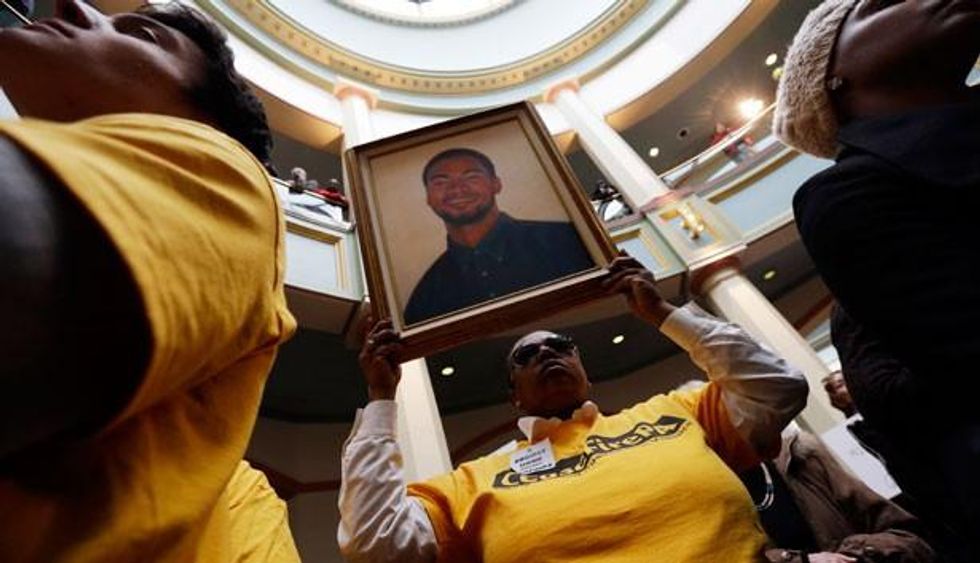In 1995, Chicago resident Shirley Chambers lost her first child to gun violence. Her 18-year-old son, Carlos, was shot and killed by a 16-year-old high school classmate. Five years later, her 15-year-old daughter, Latoya, was killed by a 13-year-old boy. Only two months after his sister was gunned down, Shirley Chambers's son Jerome was shot and killed outside of the Cabrini-Green housing projects in which they lived. He was 23-years-old. Jerome's death left Shirley with one surviving child, Ronnie. "I'd pray for God to protect Ronnie and keep him safe day and night," she told the Chicago Sun-Times. She was speaking to them on the occasion of Ronnie's death, shot and killed this past Sunday at the age of 34.
Ronnie is one of seven killed and six wounded in Chicago over the weekend. He is one of forty homicides in the city during the month of January. He will be his mother's last. Over the course of eighteen years, Shirley Chambers has had to bury all four of her children as a result of gun violence.
On Monday, President Obama met with police chiefs from Newtown, Connecticut; Oak Creek, Wisconsin; Aurora, Colorado; and Tucson, Arizona to discuss how to prevent the types of mass shootings these cities experienced recently. Because for all the talk about gun control as of late, the goal has really been fewer mass shootings. It says as much in the press release that preceded the president's press conference on January 16, where he signed twenty-three executive orders and introduced his proposals for congressional legislation on gun control--the intent behind these measures is "to better protect our children and our communities from tragic mass shootings like those in Newtown, Aurora, Oak Creek, and Tucson." There is no national conversation on how to end gun deaths like those of Shirley Chambers's children, or the more than 500 in Chicago last year or the thousands more just like them across the country. Spoken or not, the sentiment appears to be that gun violence is more acceptable in certain places among certain people than it is in others.
It may be that addressing this type of violence is better handled by local governments, as opposed to on a federal level, so legislation can be crafted to the specific needs of each city. To that end, Chicago's Mayor Rahm Emanuel is pushing for new ordinances that would, according to the Sun-Times, "broaden the requirement for reporting the loss, theft, sale or transfer of firearms to all gun owners in all of Cook County and double the jail time for an array of gun violations." This new requirement of reporting lost, stolen, destroyed, or sold firearms would extend to all gun owners, not just those with city firearms permits, as currently constituted. It would also extend to Cook County, which includes the areas immediately surrounding Chicago, a move that is constitutionally questionable, but has the support of County Board President Toni Preckwinkle. The hope is that this will stop the flow of illegal guns into Chicago and the hands of gang members.
But whether it's Chicago, Oak Creek, Detroit, New York or Tucson, the problem is the same: guns. There are too many of them and they are too easy to get. There should be less of them and they should be much harder to get... for everyone. As I've said here before, the idea that keeping guns out of the hands of "bad" or "dangerous" people will solve the problem of gun violence rests on the fallacy that "good" people never do the wrong thing. It's not the people that make guns dangerous, but the other way around.
In 2000, then Newark, New Jersey city councilman Cory Booker said in a C-SPAN interview that in his urban environment he saw "little to no need for guns at all" and that "if I had the power to do so," he would ban all guns. As mayor of Newark, Booker, according to the Star-Ledger, said, "My experience over the last seven years as mayor has given me a very practical, nuanced, data-driven and experienced view as to what policy works to help empower people and advance our city."
The problem is, thus far, "practical" hasn't worked. "Practical" has only lessened the epidemic. "Practical" has Shirley Chambers carrying extra flowers when she goes to visit her children at the cemetery. "Practical" is damn lethal.
We are a nation of the Second Amendment and guns. But we don't have to be.
